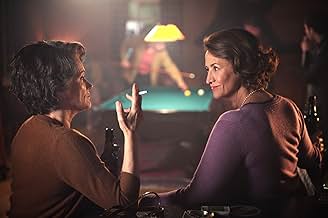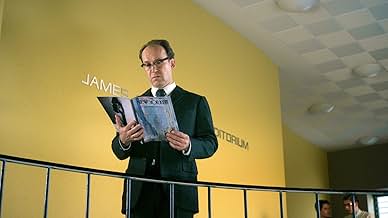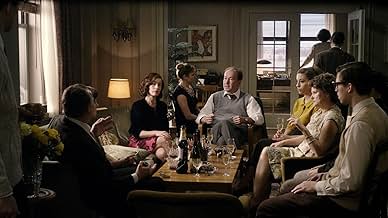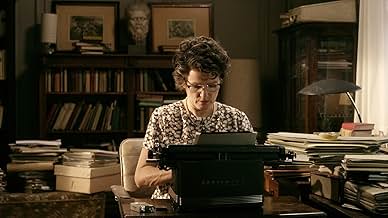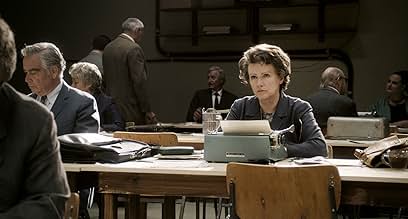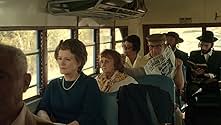Hannah Arendt
- 2012
- Tous publics
- 1h 53min
Regard sur la vie de la philosophe et théoricienne de la politique Hannah Arendt, envoyée par le New Yorker pour suivre le procès du criminel de guerre nazi, Adolf Eichmann.Regard sur la vie de la philosophe et théoricienne de la politique Hannah Arendt, envoyée par le New Yorker pour suivre le procès du criminel de guerre nazi, Adolf Eichmann.Regard sur la vie de la philosophe et théoricienne de la politique Hannah Arendt, envoyée par le New Yorker pour suivre le procès du criminel de guerre nazi, Adolf Eichmann.
- Réalisation
- Scénario
- Casting principal
- Récompenses
- 8 victoires et 18 nominations au total
- Student Laureen
- (as Leila Schaus)
Avis à la une
Few movies based on historical figures manage to combine a good sense of character with a first-rate story. Hannah Arendt is an exception. It is directed by Margarethe von Trotta, who had focused on such diverse (and strong) women of history as the nun and mystic Hildegard von Bingen and the leftist revolutionary Rosa Luxemburg. Her latest film is the story of one key episode in the life of Hannah Arendt, the German-American philosopher and political theorist. But Hannah Arendt transcends the bounds of "feminist" filmmaking. It is a work that puts before the viewer key questions about the nature of evil, about acceptance of authority, and about personal responsibility. At the same time it is a fine piece of storytelling.
Arendt was a German Jew who had studied under the noted philosopher Martin Heidegger, and who had a romantic relationship with him that soured when the Nazis came to power and Heidegger publicly supported them. She soon left Germany for France but in 1940 was imprisoned by the Vichy regime in the detention camp in Gurs. Escaping after a few weeks imprisonment, she fled with her husband to the U.S. Throughout and after the war she was active in Jewish causes, including the Zionist movement. In the 1950s she began a career of writing and teaching, which included appointments at such universities as Princeton, Yale and the University of Chicago. She became noted for two popular books, The Origins of Totalitarianism and The Human Condition.
The film deals with one short period in her life, Arendt's reporting on the 1961 Adolf Eichmann trial in Jerusalem for the New Yorker magazine, coverage she later turned into a book. In here account she spoke of "the banality of evil," evil done without thinking, because people were "following orders." Arendt's suggestion was that Eichmann was evil not so much because he was a monster, but because he was a mindless bureaucrat. Although she did not disagree with the guilty verdict or Eichmann's hanging, she was critical of the conduct of the trial. Even more controversial was her submission that some Jewish leaders contributed to the magnitude of the Holocaust by their complicity with the authorities. While she recognized the futility of open rebellion, she suggested that less cooperation would at least have saved more lives. Such suggestions, especially coming from a prominent Jew, provoked a firestorm of criticism, and threatened both Arendt's career and lifelong friendships. The movie becomes not just about a single life, but about freedom of expression - the sometimes harsh clash between ideas and fixed opinions - and the great personal costs this can involve.
Still, a movie that focuses so much on one individual requires a superb piece of acting. Director von Trotta gets this from Barbara Sukowa, who played both Hildegard and Rosa Luxemburg in her earlier films. Sukowa brings to the screen not only a supremely intelligent woman, but a very principled and determined one. At the same time she portrays a woman who can be tender and compassionate, and understanding even of her detractors. To blend such widely divergent qualities is no easy task, but Sukowa succeeds in anchoring them securely in the character she plays. Axel Milberg as Heinrich Blücher, Arendt's husband, more reserved, but supportive and protective, is equally credible. Another solid performance comes from Janet McTeer as the political activist, author, and Hannah's steadfast friend, Mary McCarthy. Included also among her inner circle was her secretary, Lotte, played very sympathetically and competently by Julia Jentsch. Two longtime Jewish friends, one in New York, Hans Jonas, and another in Jerusalem (also her former teacher), Kurt Blumenfeld, are very well represented by Ulrich Noethen and Michael Degen. And a very unrepentant and unapologetic Martin Heidegger is played by Klaus Pohl.
In addition to good acting a film that deals with the realm of ideas also requires a finely tuned screenplay and talented direction so that it does not just show pictures of "talking heads." Director von Trotta cooperated with Pam Katz on the script, and what they produced is obviously a labor of love. The situation of ideas against the background of such horrific concrete acts as genocide, and in particular against the showpiece trial of Eichmann, brings them into contact with the very real world. That reality is heightened by the decision not to dramatize Eichmann himself, but to show the genuine article as he appears in the TV footage of the trial. There is such genuine horror there, and yet such obvious banality, as to give Arendt's musings real weight.
In the end the film obliges the viewer to confront the questions Arendt is trying to raise. Are the roots of evil obvious or can they be far more subtle? Where does responsibility begin, and who in a society must take responsibility for the acts of the whole body? The film does not preach, but it certainly raises vital questions. A real gem! Hannah Arendt premiered at the Toronto International Film Festival on September 11, 2012. The movie will go into general release on January 17, 2013.
The film stars Barbara Sukowa as Arendt, who was one of he leading intellectual thinkers of the 20th Century. Arendt's history reads more like fiction than non-fiction. As discussed in the movie, she studied in Germany under the great philosopher Heidegger, was imprisoned in a Nazi internment camp in France, from which she escaped, came to the U.S., and taught at some of the finest universities in our country.
The movie concentrates on the furor that arose after Arendt wrote about the Eichmann trial for The New Yorker. (These articles were later published as a book.) Arendt brought forth her theory of the banality of evil in these articles. Her point was that an evil person like Eichmann was not a monster, but rather a person who has renounced his ability to think, and therefore has renounced his status as a human being.
Arendt believed that Jews who accepted a modicum of authority from the Germans contributed to the Holocaust, because without the Jewish leaders to maintain order, there would have been more chaos and less killing of Jews.
This latter belief made people furious, because it suggested that the Jews were partially responsible for their own fate. This is hard enough to hear now. You can imagine how it was received in 1961, less than 20 years after the Holocaust.
One weakness of the film is that the script suggests that "everyone" was talking about Arendt's writing. Then, as now, the intellectuals of the Upper West Side of Manhattan did not represent a true sample of the U.S. population. Many people were aware of the Eichmann trial, but Arendt's writings passed unnoticed by most people.
Another weakness is that characters in Arendt's life are introduced once, and then never again. If you miss the names the first time, you'll just have to live without knowing who was whom. That's not so bad, because you can accept Barbara Sukowa as Arendt. Everyone else in the film revolves around her.
If you're interested in the Holocaust and in 20th Century philosophy, the film is a must. Even if those topics aren't important to you, the movie is compelling as a study in human behavior and human interactions. We saw the film at the Rochester Jewish Community Center as part of terrific Rochester Jewish Film Festival. If it's available on DVD or at another festival, I recommend that you see it.
Barbara Sukowa portrays the German Jewish philosopher during the period she covered the Adolf Eichmann trial in Israel for The New Yorker. The film confronts the controversy Arendt raised when (i) she redefined Eichmann not as a monster but as an ordinary nobody, exemplifying "the banality of evil," (ii) she reported that some Jews collaborated with the Nazis, resulting in more deaths than chaos would have caused, and (iii) she said she loves her friends but not any "people," in this case, the Jews. On all three counts she was condemned for abandoning her people. Today, at a remove from the heat of that moment, she was clearly correct on all counts. For more see www.yacowar.blogspot.com.
Not loving the Jews was not being anti-Semitic but refusing to emotionalize her consideration of the issues. Arendt was opposed to the blanket love of any group of people, not based on personal engagement, because such nationalist or other group identification precluded the thoughtful consideration of any issues around them. She most valued a rational, thoughtful approach that was not prejudged or proscribed by any -ism or convention. As for some Jews' collaboration, she simply reported facts that arose at the trial. (Indeed, Rudolf van den Berg's new film Suskind details precisely that collaboration.) Nor was that observation anti-Semitic, for the possibly well-intentioned collaboration in the face of horrid danger is a plausible response among any people. Arendt was pilloried for facing the facts and for rejecting myths. That's what historians are required to do and apparently what philosophers periodically have to remind them to do.
This is a brooding and thought-provoking biographic drama about the notorious philosopher focusing mainly the Eichman trial . Stands out the wonderful acting by Barbara Sukowa who is terrific in the title role . Support cast is frankly excellent such as Axel Milberg as her husband Heinrich Blucher , Janet McTeer as the writer Mary McCarthy and Julia Jentsch as her helper , the latter also starred another good film about Nazism titled ¨Sophie Scholl¨ . The motion picture was well directed by Margarethe Von Trotta and it belongs a trilogy dealing with Nazism , formed by ¨Roxa Luxemburg¨ also starred by Barbara Sukowa and ¨Rosenstrasse¨or Street of roses .
The picture is based on real events about Hanna Arendt life ; Arendt's first major book was entitled, The Origins of Totalitarianism (1951), which traced the roots of Stalinist Communism and Nazism in both anti-Semitism and imperialism . In her reporting of the Eichmann trial for The New Yorker, which evolved into Eichmann in Jerusalem : A Report on the Banality of Evil (1963), she coined the phrase "the banality of evil" to describe Eichmann. She raised the question of whether evil is radical or simply a function of thoughtlessness, a tendency of ordinary people to obey orders and conform to mass opinion without a critical evaluation of the consequences of their actions and inaction.Arendt was sharply critical of the way the trial was conducted in Israel. She also was critical of the way that some Jewish leaders, notably M. C. Rumkowski, acted during the Holocaust. This caused a considerable controversy and even animosity toward Arendt in the Jewish community. Her friend Gershom Scholem, a major scholar of Jewish mysticism, broke off relations with her. Arendt was criticized by many Jewish public figures, who charged her with coldness and lack of sympathy for the victims of the Shoah/Holocaust. Due to this lingering criticism, her book has only recently been translated into Hebrew.
Le saviez-vous
- AnecdotesFor a deeper understanding of this story, one might care to watch Opération Finale (2018), which depicts the undercover mission to find and extract Adolf Eichmann from Argentina and bring him to trial in Israel. Showing the background of an operation sanctioned by PM David Ben-Gurion, the film gives a glimpse of the complexity of Eichman's character, his futile attempts to justify his actions and tell his side of the story.
- GaffesWhen Arendt stands on the terrace of her hotel in Jerusalem at looks across the Valley of Hinnom at the Old City, there are Israel flags flying from the Tower of David complex. However, the Old City of Jerusalem was still under Jordanian control in 1961.
- Citations
Hannah Arendt: You describe a book I never wrote.
Siegfried Moses: A book that will never be allowed in Israel. And won't appear anywhere else either if you have any decency left.
Hannah Arendt: You ban books, and lecture me about decency!
- ConnexionsFeatured in Kino Kino: Hannah Arendt (2013)
Meilleurs choix
- How long is Hannah Arendt?Alimenté par Alexa
Détails
- Date de sortie
- Pays d’origine
- Site officiel
- Langues
- Aussi connu sous le nom de
- 漢娜鄂蘭:真理無懼
- Lieux de tournage
- Sociétés de production
- Voir plus de crédits d'entreprise sur IMDbPro
Box-office
- Montant brut aux États-Unis et au Canada
- 717 205 $US
- Week-end de sortie aux États-Unis et au Canada
- 31 270 $US
- 2 juin 2013
- Montant brut mondial
- 8 880 936 $US
- Durée1 heure 53 minutes
- Couleur
- Mixage
- Rapport de forme
- 2.35 : 1
Contribuer à cette page






